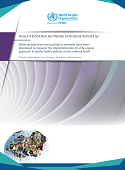What quantitative and qualitative methods have been developed to measure the implementation of a life-course approach in public health policies at the national level? (2019)

Download
By Chandni Maria Jacob, Cyrus Cooper, Janis Baird, Mark Hanson
Health Evidence Network synthesis report 63
2019, x + 50 pages
ISBN 978 92 890 5393 8
CHF 25
Order no. 13400204
A life-course approach to health and well-being has become a pillar in health policy-making; for example, Member States of the WHO European Region in the 2015 Minsk Declaration resolved to make greater use of a life-course approach in health policies. However, strategies for implementation of a life-course approach, and a plan for monitoring and evaluating this implementation, are lacking. This scoping review identified a lack of literature with a focus on measurement of the implementation of a life-course approach. The report provides suggestions from research on a life-course approach in public health interventions and national-level strategies that could aid policy-makers in developing a measurement framework. For example, Member States using a life-course approach in policy at a population level could report on existing interventions in key stages of the life-course using existing survey platforms and routinely collected quantitative data. Ideally, a monitoring and evaluation framework collecting data longitudinally across different life stages over time should be created for Member States.



